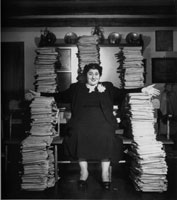
Filmmaking | Interviews | New England | New York | Television
Yoo-hoo, Filmmakers, Fight On!
Written by Maddy Kadish | Posted by: erin
Gertrude Berg is the most famous woman in America you’ve never heard of. She was a broadcasting trailblazer who is credited with inventing the modern day sitcom. Award-winning director Aviva Kempner celebrates Berg’s life and achievements with her latest and fourth documentary, Yoo-hoo, Mrs. Goldberg.
At the end of July, Kempner received a Freedom of Expression Award from the San Francisco Jewish Film Festival.
Kempner will be in Boston for a pre-release screening of Yoo-hoo, Mrs.Goldberg on August 6th at West Newton Cinema, sponsored by the Boston Jewish Film Festival. The film then launches at the Kendall Theatre on August 7th, and at the Coolidge Corner Theatre and West Newton Cinema on August 14th.
The Boston Jewish Film Festival also presented Kempner’s film, The Life & Times of Hank Greenberg in its Boston premiere at the 1999 festival. Kempner won a Peabody Award for that film.
Yoo-hoo, Mrs. Goldberg lovingly celebrates the achievements of broadcasting pioneer Gertrude Berg. Berg produced, wrote, and starred in The Goldbergs, a hit radio-turned-television show, about a Jewish family in Brooklyn, NY. The radio show ran from 1929 to 1946. In 1949, it became television’s first character-driven domestic sitcom. The Cosby Show, Family Ties, The Honeymooners and many other hits can thank Berg for creating the genre that paved the way for every family sitcom that followed.
Gertrude Berg portrayed Molly Goldberg, the show’s lead and family matriarch. The signature “Yoo-hoo, Mrs. Goldberg!” shouted from a neighbor’s tenement window kicked off each show. In 1950 Berg received the first Best Actress Emmy in history for her work. Berg helped to pave the way for women in the entertainment industry.
Kempner’s documentary chronicles Gertrude Berg’s life and work in its historical context of the Great Depression, the Holocaust, and later during the McCarthy hearings and the blacklists, which threatened to decimate the entertainment industry.
Kempner spoke with NewEnglandFilm.com about Yoo-hoo, Mrs. Goldberg, and how Gertrude Berg’s story inspires her as a filmmaker and can inspire filmmakers today.
Maddy Kadish: You were born in Berlin after World War II, the daughter of a Holocaust survivor and a U.S. Army officer. How does this influence your themes?
Aviva Kempner: Thirty years ago, I had an epiphany and I decided to create films about my Jewish roots. My first film was a documentary about Jewish resistance against the Nazis, Partisans of Vilna.
MK: What drew you to Gertrude Berg’s story?
Kempner: I began doing documentaries about unknown Jewish heroes and this was the one who I most identified with. I also wear three hats, producing, writing, and directing. I was at the Jewish Museum in New York and there was a replica of the Goldberg’s living room set from the show. And I thought, “Aha! I need to capture this!”
MK: What discoveries made while producing this film surprised you?
Kempner: The funny coincidence that her husband, Lewis Berg, invented instant coffee. And then later Sanka became a sponsor of Gertrude’s show. Also, the story of [show actor] Phillip Loeb becoming blacklisted. That was a sad discovery, but I’m glad to give it the attention that it deserves.
MK: Your documentary conveys the sense that The Goldbergs transcended ethnicity and religion. Tell me more about that.
Kempner: For me this is a great American story, a feminist story. It’s about being at the right place at the right time and being creative. It’s also a story about resistance — resisting the blacklisting that Phillip Loeb had to endure. Gertrude Berg’s story is encouraging. You don’t have to be Jewish to love Molly Goldberg.
MK: As a documentary filmmaker, how do you find and obtain funding for your films? Is this one of the toughest parts about documentary filmmaking?
Kempner: Oh it is. I am so lucky to have generous people who believe in me. It’s so important for a filmmaker to believe in their work. Finding funding is selling a product — you and your film! To be honest, it’s not my favorite part of the process, but the reality of it is, who can speak more impassioned than me about my work?
MK: Gertrude Berg not only was a pioneer in terms of challenging stereotypes being a Jewish woman on the radio during the Great Depression and World War II, but she pioneered a new media: television. What can filmmakers today learn from her?
Kempner: Gertrude Berg was a visionary — as a producer, as a writer, and as an actor. She totally got it. It was part of her MO. She got how people ticked. For instance, the use of a character going in and out of apartment to radically break up and change the scene – that wasn’t something new on Seinfeld. That was Gertrude Berg. This film is a shout out to filmmakers all over. You can do it! If you have a good idea, just go for it. Fight on!
MK: I was shocked to see footage of large Nazi rallies in the US in the documentary. Seeing that showed the strength that antisemitism exerted in the US at that time. Where did you find that footage? Was it hard to find?
Kempner: Most people are just as surprised as you were. I included footage of that in two of my films. It wasn’t hard to find, but most people simply don’t know it exists. I included it because Gertrude Berg’s story is not only about what she did, but what she was facing in terms of her audience. She was brave.
MK: The Goldbergs was a success at such a time in history when one could argue that Americans seemed to take no notice of antisemitism.
Kempner: Gertrude Berg created the most Jewish show at a time when antisemitism was at its height. No one on television was talking about antisemitism, but she was. She became a positive role model for people. In the end, people respected her because she cut through the antisemitism and focused on the universality of the American family that everyone could relate to.
The Goldbergs ran during the Great Depression while U.S. unemployment was skyrocketing; film interviewee and screenwriter Margaret Nagle says that Gertrude Berg’s show emphasized that “everything’s going to be okay; that you can live on very little; that joy can be found in the love that you feel for your family and not in the things that you possess.”
That was true when her show ran and it’s true today. It’s a struggle to be an independent filmmaker. Gertrude Berg’s story puts the struggle into perspective. It shows us how far things have come. And in the words of filmmaker Aviva Kempner — fight on!
Yoo-hoo, Mrs. Goldberg official site: www.mollygoldbergfilm.org
Ciesla Foundation: www.cieslafoundation.org
Related Media: Trailer: Yoo-hoo, Mrs. Goldberg
Yoo-hoo, Mrs. Goldberg official site: www.mollygoldbergfilm.org Ciesla Foundation: www.cieslafoundation.org










